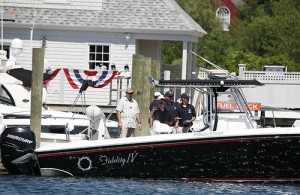 The Associated Press reported on a boating accident last week involving the elder George Bush. This is the way the AP phrased it:
The Associated Press reported on a boating accident last week involving the elder George Bush. This is the way the AP phrased it:
KENNEBUNK, Maine — Former President George H.W. Bush’s fishing boat ended up high and dry on a beach near his Maine home after it ran aground in thick fog.
Now what is so wrong about that that it inspires a blog post? I’ll tell you. The boat didn’t just run aground. Someone most likely caused it to run aground.
Let’s take that language now into the courtroom, and consider an accident at an intersection. This is the way two skilled trial lawyers will try to present it:
Defendant: The accident happened.
Plaintiff: The Defendant caused this car wreck.
For the most part, accidents don’t just happen. I dealt with this back in May when Kentucky Republican Senate candidate Rand Paul seemed willing to give a free pass to BP and its friends who dumped so much oil into the Gulf of Mexico. He wasn’t happy that President Obama criticized BP:
“And I think it’s part of this sort of blame-game society in the sense that it’s always got to be somebody’s fault instead of the fact that maybe sometimes accidents happen,” Paul said, who is a darling of the Tea Party movement.
It’s true that acts of nature may take over, such as the lightening strike that fells a tree right into the path of a car. One might argue that acts of nature are even more likely at sea, given waves and fog, but it is just those types of foreseeable risks that a captain must consider. Only something unexpected would allow the act of nature defense to come into play.
Acts of nature are not how most accidents occur. Returning to former President Bush, the article goes on to give this explanation:
[Bush spokesman Jim] Appleby says Bush was close to shore in low visibility when a wave pushed his boat onto the beach.
It seems to me that if he was running his boat in low visibility it really isn’t fair to blame the boat (“it ran aground”).
And that type of passive language is just the thing that plaintiffs’ lawyers should be on the look out for and ready to counteract. “It” didn’t just happen. Someone most likely made it happen.
Photo credit: jcfmbost, via Flickr
Eric, you are right on target again.
Defense attorneys love to tell jurors that simply because a bad outcome happened in a medical malpractice case where that outcome was a “known risk of the procedure,” they claim that their client should not be held liable. What they don’t tell the jurors is that just because something is a known risk of the procedure doesn’t mean that this was not caused by carelessness.
Nor do they explain the fact that their client should still be taking responsibility for those risks to occur.
We all know that crossing the street has inherent risks and there is a risk of getting hit by a car going trough a red light. Just because a driver goes trough a red light and this is a known risk of driving a car, does not absolve them from the harm they cause by their negligence.
When a driver carelessly crosses over the double yellow line and hits another car head-on, this too is a known risk of driving. However, simply because this is a risk of driving does not mean that the driver can wash his hands of any responsibility for causing a horrific accident.
I like your analogy and find it very appropriate.
Gerry Oginski
On the other hand, sometimes the surgeon (and ev eryone else associated with the surgery does everything right, gets a bad result and gets sued anyway.
That’s justice for you, isn’t it Eric ?
On the other hand, sometimes the surgeon (and ev eryone else associated with the surgery does everything right, gets a bad result and gets sued anyway.
You know what’s funny? As the email came in with your comment, I was on the phone and in the process of rejecting a matter (from another lawyer) where there was a bad result, but he couldn’t answer the question: So what did the doctor do wrong?
For those that know what they are doing, the rejection rate is an easy 95-98% from the inquiries that come in.
There is a name for lawyers that take bad cases: Bankrupt.